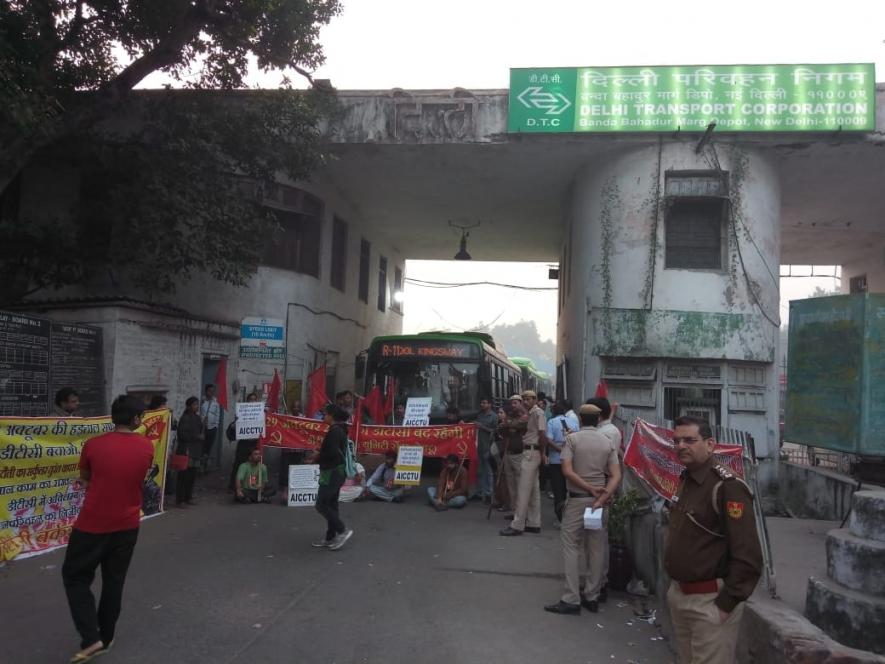Historic DTC Strike Creates Chakka Jam Across Delhi

Despite a crackdown by the Aam Aadmi Party (AAP) government, about 10,000 workers of Delhi Transport Corporation (DTC) led a historic strike, the first since 1988, across the 36 bus depots.
“They (the government) can try all they can but it can’t put breaks either on the movement of the workers or crumble the lifeline of the commuters under the garb of privatising the transport corporation,” Shweta, the AICCTU Delhi president, told Newsclick.
The Chakka Jam drew immense support from across 11 unions, which included all central trade unions (AICCTU, AITUC, AIUTUC, CITU, HMS, INTUC, TUCC, SEWA, LPF, UTUC, MEC), except RSS-BJP affiliated Bharatiya Mazdoor Sangh (BMS).
In a knee-jerk reaction a day before the strike, the Arvind Kejriwal-led Delhi government, which had made all attempts to stall the protests, restored the minimum wage rates for contractual employees prevailing before August 4, 2018, and withdrew the orders for reducing it.
Read More: DTC Workers Hold Namak-Mirch-Roti Dharna Ahead of Oct 29 Strike
Despite the government’s tactics to ensure low participation, such as the Lieutenant Governor imposing the Essential Services Maintenance Act, 1974 on DTC for six months, banning all strikes for six months, the workers took to the streets of Delhi to assert their demands for equal pay for equal work and permanency of contractual workers.
Speaking to NewsClick, Naresh, a DTC bus driver, said, “I am a contractual worker, I have to wake up at 2.30 every morning to ensure I come first to get the duty. Some days I am made to sit at the depot for hours at length without getting any duty.”
The contractual workers have been alleging wage discrimination between permanent and contractual workers. Rajesh, a conductor, said: “The government attempted to create a rift between the permanent and the contractual workers to ensure that the strike gets called of and its impact is not as big as the one we witnessed today. I feel we have proven the government wrong and told them that DTC belongs to its people and they cannot divide us in our battle to rightfully fight for what is ours.”
In a statement, the All India Central Council of Trade Unions (AICCTU) condemned the Delhi Government’s decision to impose ESMA on agitating workers of DTC, saying that these tactics were “ploys by the ruling AAP Government of Delhi and BJP to malign and mislead the struggle of DTC workers. AICCTU and its affiliated union – DTC Workers Unity Centre -- stood firm with their call for one-day strike.”
Haryana Roadway Workers in Solidarity
To express solidarity with the protesting workers, the transport workers of Haryana Roadways, who have been on strike for the past 14 days ,also joined in. Yashveer Joon, leading the coordination efforts in Haryana, told NewsClick, “We have in the past expressed solidarity with the DTC and we will continue to do so, the struggle is not just about DTC or us but about collectively doing away with injustices against the workers.” The ML Khattar led BJP government in Haryana has also tried to aggressively crackdown on the workers in the state by imposing ESMA, despite this, the workers have been steadfast in their struggle.
Abhishek from AICCTU said in Delhi ,the BJP has been scrutinising the AAP government, but their governments have been repressing workers across Rajasthan and Haryana.
In the run-up to today’s strike, the the DTC workers had held a Namak-Mirchi-Roti Dharna on October 22 outside the IP depot.
Despite the ongoing agitation since August, the AAP government has refused to engage with the unions. Using the DTC administration as its puppet, the government had instead threatened the workers by issuing a letter warning them of “consequences, such as the loss of service, break in service and other disciplinary action” if they went ahead with the strike.
The agitation of DTC workers has gained momentum since August this year after the Kejriwal government decided to cut daily wages of contractual workers attached to DTC by about ₹3,500-4,500 per month. The move came into effect on August 5, after the Delhi High Court quashed a March 2017 notification of revising the minimum wages for unskilled, semi-skilled and skilled workers in the city, saying that it was “ultra vires Article 14” of the Constitution of India.
In September, the DTC workers had conducted a secret ballot, which resulted in an overwhelming number of workers -- almost 99%-- voting in the favour of today’s strike.
The workers maintained that though AAP had restored the previously applicable wages, the larger question of privatisation of DTC still remains and they will continue to oppose it tooth and nail. The workers told NewsClick that a major convention of transport workers is to be announced soon to chart the future course of action.
Read More: DTC Workers Vote for Historic Strike on October 29
Get the latest reports & analysis with people's perspective on Protests, movements & deep analytical videos, discussions of the current affairs in your Telegram app. Subscribe to NewsClick's Telegram channel & get Real-Time updates on stories, as they get published on our website.























